Time is something that impacts everyone.
There are only 24 hours in a day, 7 days a week.
We have more demands on our time than we have the time to do those things.
Some of those demands are things we inflict on ourselves. Some of those demands are the result of requests from others.
However we choose to commit our time, we have to use it as well as we possibly can. Once the time has passed, there are no re-do’s.
We have many tools/techniques for allocating our time. We try to seek balance across the demands of work and those things that are important to us outside work. We prioritize the things important to each of us. It may be sleep, family time, workouts, sports, travel, other things.
In business, our time is not always our own. We have things we need to accomplish as parts of our jobs. It may be work we can accomplish ourselves, involving no others. We leverage tools and good habits to accomplish these things as effectively and efficiently as we can.
Much of our time involves working with others. There are project reviews, team meetings, work group meetings. We have meetings with our managers, and with the people we lead. There may be meetings with outsiders, partners, customers, suppliers. There are conferences, trade shows, and events. Any number of things can make claims on our time.
And, universally, we find our time is not being well spent. We waste time ourselves, multitasking, shifting our attention every 30 seconds. Others do things that waste our time. We are invited to meetings we don’t need to be in. We are invited to meetings that achieve nothing, so we have to meet again. We participate, willingly and unwillingly, in too many things that waste our time.
In the end, time continues to pass. Hours turn into days, weeks, months, years. And we waste more time than we want. We want time to achieve more, whether professionally or personally.
There are endless books, many useful, offering advice on how we better manage time. Time blocking, creating good habits, and on and on. There are tools that measure how we use our time, and tools that help us better manage our time. My watch beeps, telling me to stand, go to the gym, sleep, go to meetings, and so forth.
While all these things have the goal to help us use our time better, we still tend to use our time poorly. At the end of each day, we see what we didn’t accomplish, we look at tomorrow and see more things piling up.
In the end, there is only one determinant of how well we are using our time. It’s asking a simple question:
Will that be a good use of my time? Alternatively, Was that a good use of my time?
As we plan our days, we have to ask ourselves the question for everything we schedule. As we go through our days, we should ask ourselves that question at the end of each activity.
As we plan meetings, we should ask that question, “Will this be a good use of each participant’s time?” While we are probably doing something that’s important to us and how we spend our time, until we know that it is, also, a good use of each participant’s time, we run the risk of wasting out own time.
After each meeting, we should conclude with a simple question, asking for honest answers, “Was this a good use of your time?”
We won’t get “Yes’s” every time, but the more we get, the more we will find ourselves accomplishing.
We may consider making meeting attendance optional. We invite people to a meeting that has a certain goal/objective. If they attend, they are giving us some indication they expect their time will be well used. When we show up and the “room” is empty, whether a conference room or other meeting room, or a virtual meeting room, it should tell us how others feel about how we are using their time.
We will never solve the “time” problem. We will always have more demands on our time than we have time available. But if we can look back on each thing we do and can answer, “That was a good use of my time,” we won’t achieve what is most important to us.

Leave a Reply